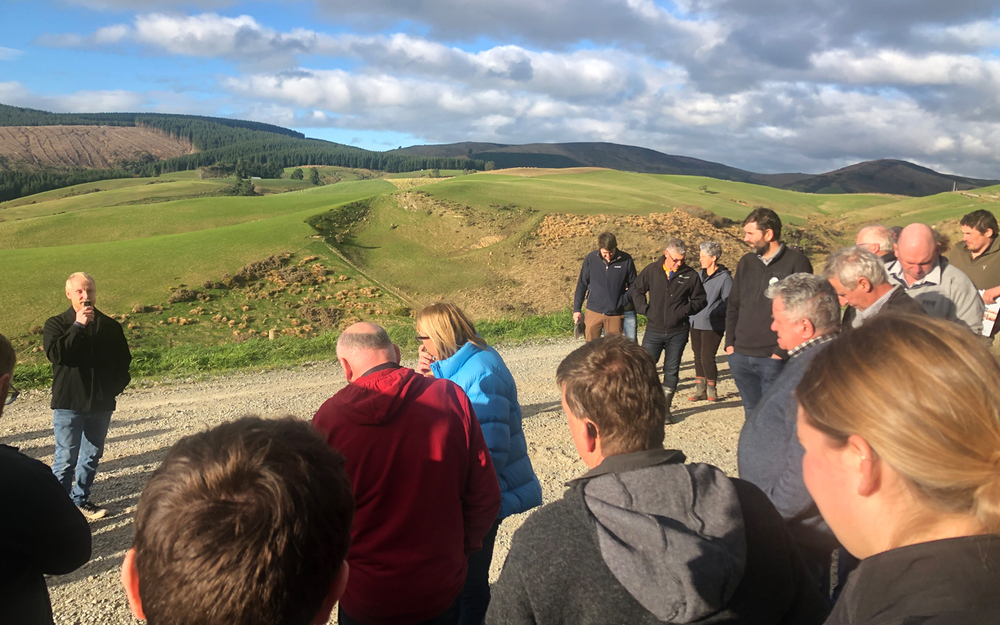No silver bullet as Dipton addresses green house gases
McCarthy Media
20 July 2023, 10:05 PM
 Lynden Prebble talking at speaking at the Carbon Neutral Dipton Project Outcomes Field Day held this week (17 Jul). Photo: McCarthy Media
Lynden Prebble talking at speaking at the Carbon Neutral Dipton Project Outcomes Field Day held this week (17 Jul). Photo: McCarthy MediaThere might not be a silver bullet to reduce Greenhouse Gases (GHG) on farm, but there’s plenty of silver buck-shot that can contribute to significant improvements.
That was one of the themes that shone through at the Carbon Neutral Dipton Project Outcomes Field Day this week (17 July).
Carbon Neutral Dipton is an aspirational, farmer-driven project aiming to balance environmental and economic sustainability through innovative on-farm change. The project started in November 2022.
More than 50 people attended event at the Dipton Hall on 18 July with presentations, farm visits and Q&A session making for a thought-provoking and informative afternoon.
Farm consultant Chris Beatson from AgriMagic and forestry consultant Don Frengley presented their findings from working with five Dipton case study farmers — Clare and John Officer; Chris and Charleen Withy (both dairy); Chris and Serra and Jake and Joney Stewart; Brian and Kristine Russell; and Tony and Rayleen Dunnage (all sheep and beef).
Project manager Alexis Wadworth said it was a fantastic opportunity to meet the farmers, buddy farmers and consultants involved, visit two of the farms, and share experiences and outcomes.
“It’s great to be collectively thinking a bit outside the box about how we can aspire to be carbon neutral.”
Greater Dipton Catchment Group Chair Lynden Prebble said the project had been really positive and practical.
“We’re front-footing it from the ground up. We’re involving everybody and sharing ideas as we go on this journey.”
The consultants worked with the farmers and buddy groups to assess baseline emissions and then modelled and evaluated different ideas, with 4-5 scenarios considered for each farm.
Scenarios included retiring or intensifying smaller areas of properties, changing livestock numbers or policies, planting crops such as oats, barley or maize, alternative wintering systems, or planting trees, among other ideas.
A common thread was that small adjustments across operations can add up to significant wins within existing farm systems, even when people are doing pretty much everything right – as is the case with all the farms involved.
Another strong theme was rethinking the management of steeper areas, such as weedy gullies, with opportunities such as tree planting.
Brian Russell said making less productive land work for them to “pay its way” was important.
Planting out these areas also saved money that would otherwise be spent on trying to maintain it as pasture.
Frengley said there was a lot of opportunity and risk with forestry, and that over time returns averaged out at about 10%.
Chris Withy said being part of the project highlighted that there was no one thing that would greatly reduce their on-farm GHGs without drastically altering their bottom line. An oat crop scenario just did not stack up for them, he said.
Technological advancements would continue to assist with efforts to reduce carbon footprint, he added.
The farmers talked about being as flexible and agile as possible, and not putting all your eggs in one basket.
Everyone agreed that running the ruler over their existing operations, and thinking about different scenarios, was invaluable as they looked to fine tune their farms.
Jake Stewart talked about being open and honest about farming operations, and how it helped bring new ideas to the table. “Don’t be scared, try and go out and make a difference.”
Chris Stewart said they were quite proud of the food they produce. “We’re feeding the world.”
Prebble said the group was looking at next steps, and were keen to discuss the project and its outcomes with industry stakeholders.
“There’s a couple of things in the pipeline. We are looking at green energy production in Dipton and looking at the voluntary environmental credential market. There may also be more to look at within the case study farms.”
Dipton farmer Peter McDonald closed out the event by saying that while there was no silver bullet, there was some “silver buck-shot” that would greatly assist with continuous improvement on farms.

Don Frengley speaking at the Stewart family property as part of the Carbon Neutral Dipton Project Outcomes Field Day held this week (17 Jul). Photo: McCarthy Media
The project had attracted public, industry and corporate interest as the wider Dipton community was seen to be approaching GHG challenges in a positive and optimistic manner, he said.
The summary report and the full case study reports are available at https://www.thrivingsouthland.co.nz/carbon-neutral-dipton/
The project is funded by Thriving Southland and the Ministry for Primary Industries.
NEWS



